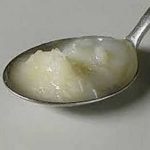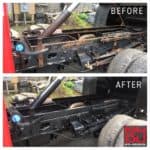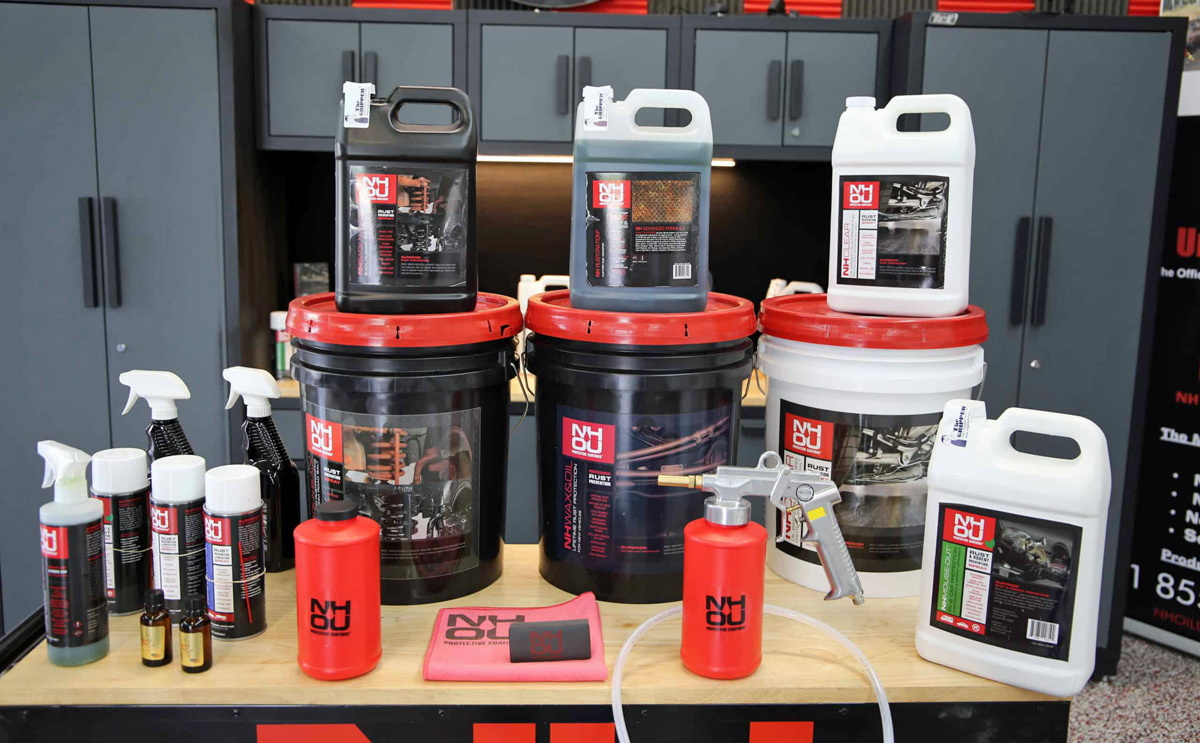Undercoating
With apologies to Sir Walter Scott, who said “time will rust the sharpest sword,” we say rust will ruin the sharpest car (unless it is made of plastic).
Undercoating
Crawl under your vehicle. Look around at the suspension components, frame, bolts, drive shafts, everything metal. If you’re lucky, it’s doesn’t look too bad right now. But there’s probably rust here and there. Surface rust creeping around, in the cracks, on the welds, on the castings.
The problem with rust is it’s the oxidation of your iron and steel parts thanks to moisture and oxygen. Oxidation is synonymous with corrosion, which literally means your metal is disappearing! You people who live in the rust belt know what I’m talking about. Long-drawn out winters with roads covered in sodium chloride, otherwise known as nasty, vehicle eating, crushed rock salt carved out of underground mines. This stuff is hell on the underside of your vehicle because it accelerates the rusting process. Here’s the thing, I got bad news for you. Right now the underside of your vehicle looks as good as it’s ever going to look. That is unless you do something about it.
What exactly is Rust and why is it so bad?
Rust is the chemical process of oxygen and water combining with iron (like the steel in your car, truck, van or SUV). When those elements find unprotected steel, they merge forming the brown, flakey material we call rust. Rust corrosion will eventually eat completely through your metal vehicle unless you stop rust.
Rust can majority reduce the life of your vehicle, and so it’s vital to take steps to prevent rust from happening! In NH, where we have particularly harsh winters, undercoating is one of the most important things you can do to prevent rust and ultimately extend the longevity of your vehicle!
When you finally decide to buy a new car it is a very exciting day. Although many assets appreciate in value as they age, a car is not one of them. Edmunds estimates that new cars lose as much as 20% of their value as soon as they are driven off the lot. But you have improved your car’s resale value by wisely being proactive with corrosion.
Undercoating / Rustproofing effectively seals areas from the environment, abrasion, and harsh chemicals like road salt. With specialized tools and training, a skilled technician has the ability and knowledge to seal all of the areas of your vehicle that need it and avoid all the areas that don’t. Undercoating / Rustproofing also helps reduce road noise. With yearly maintenance, you can have your undercarriage sealed for years to come!
The fact is, a new vehicle is subjected to thousands of spot welds and numerous bends and folds during production.
This process damages the pre-coated metal, allowing exposure to the corrosion process. Besides cosmetic damage, corrosion also weakens a vehicle’s structural integrity.
With the introduction of road brine ( liquified salt ) this extremely corrosive solution is now able to penetrate deep into your vehicle’s body cavities where rock salt could not. Many of these Road brine solutions contain magnesium chloride, calcium chloride, and additives to help them stick to surfaces. The problem is, they don’t discriminate.
Undercoating History
Did you know early undercoating products were made from chicken fat?! This process was a flop because the high sulfur content made it very corrosive.

 Tar and tar-like compounds were a vast improvement and were used for many years, beginning around the 1950s, but they did little to prevent a vehicle’s underbody from rusting through. As the undercoating dried, chipped, and broke away in chunks, water would get trapped between the remaining coating actually accelerating and promoting corrosion.
Tar and tar-like compounds were a vast improvement and were used for many years, beginning around the 1950s, but they did little to prevent a vehicle’s underbody from rusting through. As the undercoating dried, chipped, and broke away in chunks, water would get trapped between the remaining coating actually accelerating and promoting corrosion.
Undercoating Today
Undercoating products today contain a range of ingredients including fiberglass, rubber, ceramics, silicone, asphalt, or petroleum. These products offer different benefits but all protect against damage and the elements.
Which undercoating is right for you?
This is a critical step, choose the wrong one you may trap moisture under the coating or the coating cracks in which case water gets under the coating and rusts away which you will not see until you can poke holes through your car.
Unless your vehicle is brand-new and completely rust free you should avoid hard, rubberized single application products. These products are very effective but must be applied to a rust/moisture-free surface.
A semihard product like wax that will not crack or chip from Road abrasion works best. A petroleum-based oil should also be applied inside body cavities where rust begins.
Body cavities are prone to hold moisture and the surfaces are unfinished.
The oil should be designed to migrate and creep so that it may go deep into the body cavities, spot welds, and seems. The product should have corrosion inhibitors and preferably be a non-drip formula.
Oil works very differently than hard rubberized undercoating. If the oil is formulated properly it will displace moisture from the base metal, then cut the oxygen off. Take either out of the equation and oxidation cannot occur. Oil is self-healing so it will not chip or crack but will need to be re-applied annually.
Having existing rust may not be a bad thing as it gives the product something to hang onto. If you have existing rust there is a product NH Back N Black that will significantly improve the look of the surface while protecting it. You will also create a barrier against moisture, salt, and Road brine which is a vehicle killer.
Undercoating a new vehicle
Should you use a soft oil-based rustproofing product or a one-time semi-hard wax based product?
The choice is a personal preference. In most cases, if applied properly both will be equally as effective. The upfront cost for a semi-permanent wax-based product will be significantly more than an annual application of petroleum oil.
Either service should be followed up with regular checkups and maintenance. Keep in mind when you research your options that we cannot beat mother nature, we can only hope to slow her down. Rust has been described accurately by Jonathan Waldman , Rust: The Longest War It has been called “the great destroyer” and “the evil.” The Pentagon refers to it as “the pervasive menace.” It destroys cars, fells bridges, sinks ships, sparks house fires, and nearly brought down the Statue of Liberty. Rust costs America more than $400 billion per year—more than all other natural disasters combined.
The biggest challenge is cultural more than technological. Getting people to think proactively with corrosion is the biggest challenge. Regardless of which method you choose to battle corrosion, the most important element is that you choose something. NH Oil Undercoating® offers a product Boss Wax which combines the best of both options. The product is a semi-hard black standalone application. This product on a warm day and on a very small scale can self heal. It does not collect dirt and dust as oil-based petroleum products do. But is a very effective tool in your battle to extend the life of your vehicle?
What is NH Oil Undercoating®?
NH Oil Undercoating® is designed to slow down or inhibit corrosion on vehicles. It is a petroleum-based product with rust inhibitors containing no solvents. In fact, the NH Oil Undercoating® product is environmentally safe, contains no toxins or solvents, is non-flammable, is non-reactive, is non-corrosive, can be sprayed in any weather, remains active, and is a nonhazardous unregulated product.
NH Oil Undercoating is a unique blend of highly refined petroleum and rust inhibitors that guard against rust and corrosion on all metals. It eliminates moisture containing salt, dirt, and other pollutants from the metal providing long-lasting protection for your vehicle.
Above-average products are useless if you receive a below-average application!
Penetrate & Lubricate
After NH Oil Undercoating® is applied, you can expect it to lift and remove dirt, moisture, other contaminants, and even some surface rust. It is designed to penetrate to the good metal and form its protection there. As it penetrates it pushes out existing moisture and oxygen thus eliminating oxidation-corrosion.
Stop Electrolysis
NH Oil Undercoating® stops electrolysis by disallowing the external circuit to be completed. NH Oil Undercoating is designed as a non-conductive material that also has a voltage drop of only 1/100th of a volt. After securing the connections, it can be used on electrical connections to prevent the “greening” of wires.
Active Molecular Protective Film
Once NH Oil Undercoating® has reached the good metal, it sets up a bond. This bond is at a molecular level and the film that is created is ultra-thin providing long-term protection. The inhibitors, meshed together in a chain link, are then used by the environment – contaminants, salts, etc… – before the metal has rusted.
Creeps and Self Healing
NH Oil Undercoating® is designed to creep deep into cracks, crevices, spot welds, seams, folds and provide protection there as these areas up prone to hold moisture and are unprotected. So even if the initial application cannot reach one of these areas, this creeping process assures maximum protection is provided.
Can we improve the appearance if there’s existing rust?
Yes. NH oil undercoating® Back N Black not only protects but it improves the appearance of any metal surface!
I can’t stress this enough—the most important facet of rust prevention is to think of a vehicle’s maintenance not just in terms of the engine, transmission, and drivetrain, but of the body, too. If the oil is changed on a regular basis, it stands to reason that you would take steps to keep the body clean as well. If something mechanical breaks, you fix it to prevent larger problems down the road. The same thing goes with body damage. We can’t let the rust win, after all.
●Never drive behind a plow truck spreading salt and brine.
●Avoid dusty dirt roads in the summertime.
●Think about moving to Arizona. (After this winter, you probably already are.)
Undercoating APPLICATIONS
Protection of all electrical components including fuse boxes, starter motors, alternators, pumps, and generators
Moisture repellant for inside doors and tailgates, internal vehicle panels, and electrical cabinets
Protection and lubrication of battery terminals and carriers, springs, twist locks, wheel hubs all brake hardware, wire cables, chains, nut and bolt threads
Electrical:
Protection and lubrication of circuit boards, control boxes, switchgear, toggle switches, and electrical connectors,
Protection of the micro-processing equipment of refrigeration units on road, rail, and sea vehicles
Farm & Gardening:
Protection of mowers, whipper-snippers, and slashers to prevent corrosion
Prevents grass, fertilizer, and mulch from sticking to the equipment
Marine Equipment:
Moisture-repellent and lubricant for outboard motors
Corrosion prevention for fishing tackle, reels, and rods
Corrosion prevention and lubrication for trailers and hardware
Protection and lubrication of wire rope, pulleys and cables, electric switches, metal, and plastic zippers
Seen enough? If you’re interested in becoming proactive against rust on your vehicle, use our dealer finder to locate one near you!
Find a dealer

 Buy US Direct
Buy US Direct Buy CA Direct
Buy CA Direct Buy EU Direct
Buy EU Direct Buy DE Direct
Buy DE Direct
